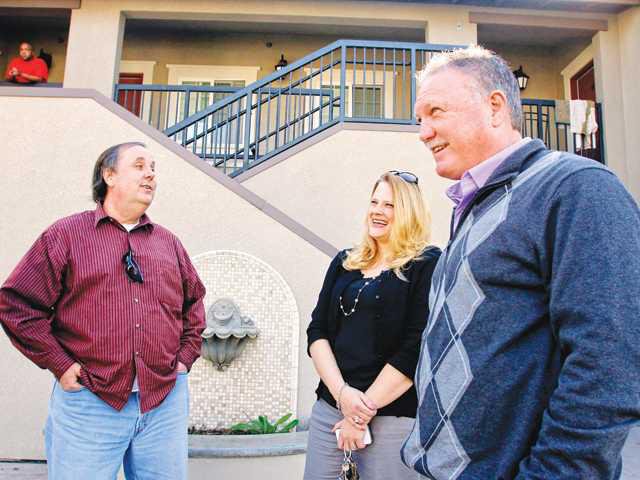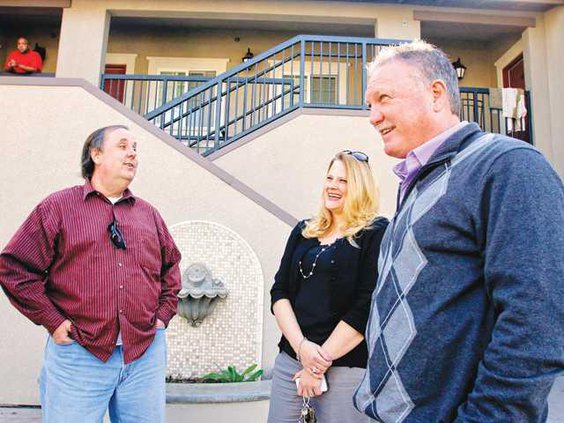Monday mornings are days of hope for dozens of families as well as single moms desperate to either keep a head over their roof or to get off the streets.
It is that day that they can call HOPE Ministries in Manteca to see if there is the proverbial room at the inn.
“We used to get more than 15 calls a day,” noted HOPE Ministries Executive Director Cecily Ballungay. “Now it is down to five or 10 a day.”
That doesn’t mean the homeless problem in Manteca and surrounding communities has ebbed. Quite the contrary. Since HOPE Ministries accepts government money — even though it represents less than 20 percent of its annual operating budget of $150,000 —they are not allowed to keep a waiting list.
To reduce frustration and to free up limited staff time, Ballungay several months ago switched to a system where callers are told to try back on Mondays after 9:30 a.m. to see if apartments at the HOPE Family Shelter on West Yosemite Avenue or rooms at the Raymus Home for single moms and their children on South Union Road have become available.
It is just one of several changes HOPE Ministries is undertaking as the economy improves and the non-profit organization that has been lending struggling families a hand up since 1991 tries to shift from survival mode to thriving mode.
The changes include:
u Expanding client services to include information and skills to help the homeless secure jobs, enhance their emotional outlook, improve their budgeting skills, and obtain more permanent housing;
u Exploring additional ways to help the homeless off the streets including working with one group interested in launching a day center for the homeless in the former Manteca News building at Yosemite and Fremont avenues recently secured by HOPE Ministries;
u Launching a community-wide effort starting with the churches to secure monthly support for HOPE Ministries;
u Securing more volunteers for basic needs such as yard maintenance to free up limited money to fund professional services that can improve a client’s chances of never needing a shelter again.
Manteca churches
provided foundation
HOPE Ministries was launched in 1991 by the Greater Manteca Ministerial Association.
Churches not only provide the seed money and the framework to help housing challenged families, including those on the streets and those who do not know from week to week where they will be saying whether it is sleeping in someone’s garage or on their couches, but they are also the biggest sources of funds for ongoing operations.
Churches financially supporting HOPE Ministries today include Calvary Community, Crossroads Grace, Place of Refuge, Manteca Christian Worship Center, First Baptist Church of Ripon, First Baptist Church of Manteca, New Hope of Manteca, New Hope of Escalon, Northgate Community Church, Sequoia Heights Baptist, Southside Christian Church, and United Methodist Women.
While it is always a struggle to financially keep the five-member staff in place that includes the executive director, house managers, maintenance person, and a coordinator of client services, Ballungay and the HOPE Ministries board is working to step up their game.
“Our goal is to get to the point here they (the clients) never need our services again,” she said.
Those clients numbered 240 last year with most being children; HOPE Ministries’ three shelters — including a transitional living shelter near Doctors Hospital of Manteca — do not serve single men or single women or adult couples without children. They are housed in seven apartments at the HOPE Family Shelter and eight rooms at the Raymus House.
Pastor Cynthia Jackson of Transformed Through Hope Ministries is instituting a five-week program to provide young women with information and skills that will enable them to see a brighter future and grasp the sills to move forward.
It covers how to seek employment, building an effective resume, preparing for an interview from how to answer questions to personal hygiene, following up with an interviewer and the potential of a second interview, and how to be gainfully employed touching on responsibilities to the employer, managing transportation and daycare and future plans.
It is in addition to existing programs that assist clients living in the shelters understand the nuances of budgeting, providing computers for them to prepare resumes, WorkNet assistance, and such. They also instruct clients in life skills and how to deal with “hurts and habits,” such as emotional issues connected with being homeless and bad habits that can undermine their ability to support themselves that can range from bad spending choices to dealing with others.
How a stay at
the shelters work
In order to stay at the shelters, clients must be drug-free. They take drug tests before they can enter and are subject to periodic drug tests during their stay.
That stay can range from 30 to 90 days, although there are exemptions for longer stays. One recent exception was a client who was pregnant and developed serious complications as she was about to move out with her children.
The first two weeks typically are spent “relaxing.”
“They have been looking for a place to land,” noted Ballungay. “Life has been a challenge. We need them to switch from survival mode so they can relax for a minute.”
After that the staff and volunteers work with clients to address emotional issues that being in homeless mode may have created that would serve as an impediment to securing housing and keeping it.
Then an effort is made to supply them with the skills needed to make it on their own.
By that time Ballungay said clients have become comfortable and are to the point they are ready to move on.
HOPE Ministries assists in making that happen by working with non-profit housing opportunities that provide low-income housing options.
And in some cases that means sharing rooms in a house or apartment. They have even had clients that have pooled resources with fellow clients to secure an apartment.
“It (sharing housing with another family) may not be ideal but it is only a temporary solution until people can get in a position to secure their own,” Ballungay said.
Sharing an apartment with another single mom was exactly what Ballungay did when she was a single mom herself.
“It wasn’t the most ideal of situations but it worked until I could move on,” she noted.
Since clients don’t pay rent, they are able to pool their money to save money for deposits and month’s rent. In many cases they have the money to make a monthly rent but not the deposit.
Also a fair number of single moms and even families that end up homeless do have jobs although they are low paying or else a financial calamity put them on the street.
Giving campaign
for the community
Starting with church congregations, HOPE Ministries are hoping to secure monthly commitments of $10 or $20 a month from families, individuals and businesses.
The campaign is being inspired in part by Manteca Police Chief Nick Obigacion’s repeated advice of encouraging city residents not to give money to panhandlers but instead make donations to non-profits that work directly with the homeless to address their needs and to get them off the streets.
Ballungay noted it mirrors the saying of “Giving a hungry man a fish he can eat for a day, but teach him how to fish he can eat for a lifetime.” Equally as important as cash donations are in kind contributions or volunteer services. Both free up limited monetary resources.
Donations of toilet paper, personal hygiene products and such mean families or the shelter don’t have to spend money on them during their stay.
A group or business interested in cutting the lawn and doing basic yard work at the Raymus Home spending just their time, use of their own equipment, and gas would free up $400 a month for the shelter.
Other volunteer needs are secretarial (typing, filing, and such), adopt a room, repairs, site clean up, donation storing, event organization, case managers, Bible studies, workshops, shed organization and site maintenance.
HOPE Ministries’ fundraisers include a summer solstice party, wine tasting, a virtual bake sale and Kids in a Box.
The Manteca Soroptimists provide holiday celebrations such as Christmas and Thanksgiving for families staying in the shelters. The Manteca Sunrise Kiwanis stage birthday parties for children in the shelters.
If you would like to help HOPE Ministries, call 209.824.0658.
GIVING HOPE
Families, single moms get chance to stay off streets thru HOPE Ministries





